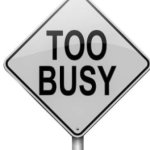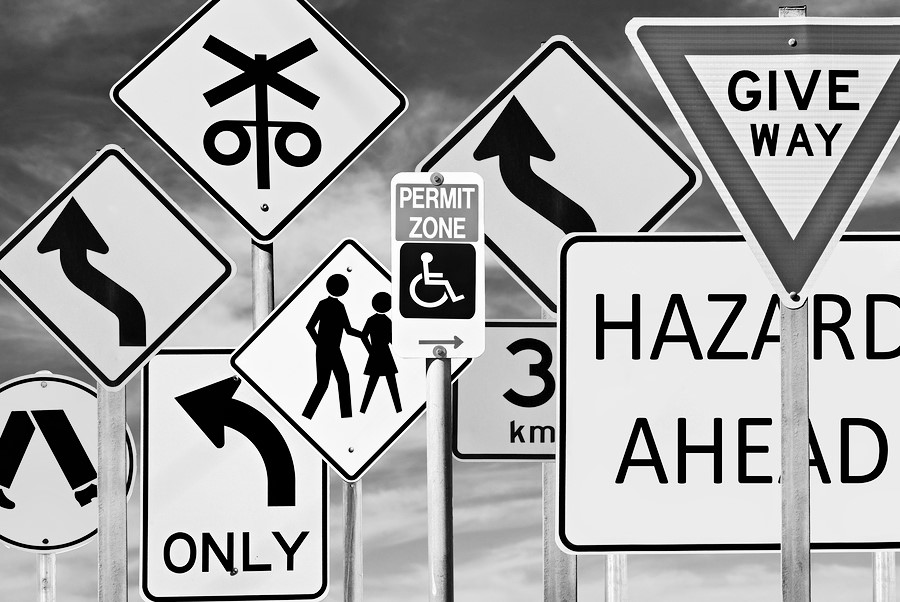We all dislike road hazards that can delay, cause an accident or create a detour. They exist too in planning the sale of your company. But business hazards usually lack good signage. So like good drivers, you look ahead to find early warning signs and alternate routes. Sometimes though, these road hazards are hidden and require a different kind of attentiveness.
They are the road hazards within you that keep you from taking the time to plan your exit. One of the biggest road hazards I see with business owners I call…
Too Busy to Leave, Too Tired to Stay.
Ever feel like that? You are so busy running your business you don’t have the time to think about how to leave it. And you are so exhausted by the daily demands over many years, you know you need to leave.
And no wonder. You are the fuel of ideas; the engine that powers your company forward; the shocks that provide stability and a smooth ride. You are so busy performing all those functions, some of which you may detest, that it’s an effort just moving down the road directly in front of you never mind looking out two years to accomplish an exit plan.
Warning Signs
When you are honest with yourself, are you facing a “Too Busy/Too Tired” road hazard within you? Here are some warning signs. 
- Do you have a need to feel everything is in control and perfect?
- Do you believe only your hands-on management and attention will bring the control or perfection you desire?
- When you take a vacation are you tied to your emails and mobile phone or at home are you reviewing reports on your stationary bike — that is, when they don’t skip the workout?
- Are you uncomfortable sitting quietly for 20-30 minutes and being ‘in the moment’?
- Do you equate being busy for being productive and effective;
- Do you see yourself primarily as The Business Owner over those other important roles of parent, spouse, friend, son or daughter?
If you answered yes to many of these questions you face a powerful road hazard to achieving your exit strategy. But you are not alone! Many of the 87% of business owners who do not have an exit strategy face it too. Seeing the hazard is the first step. Building alternate routes follows.
Alternate Routes — Reroute Your Focus & Self-Discipline
Here are three possible alternate routes.
Route 1 Define Your WHY: Studies tells us that it isn’t how hard you work but why and how you work hard that determines the impact on you, your health, and your environment. So those who have higher work enjoyment, less stress and more energy tend to work for a higher purpose. Purpose not perfection releases the fuel for exit planning.
I have a colleague who had a very successful training company. He was a “big thinker” and liked to generate “big ideas” that made “big change” happen. He wanted to get off the “too busy” corporate treadmill he had been on for 30 years. At first he set up a non-profit side of his business to bring the benefits of his corporate work into public schools, his first love. Of course that meant twice the mental work and pressure to create ‘big results’. It wasn’t until he looked at his internal measure of success that he could change from “go big” to “engage my heart”. He found a way to mentor a college class with a great workbook he wrote. He dramatically changed his energy, his focus and his ability to let go and leave his company.
Ask Yourself: How can you bring a higher purpose into your work or into your life outside of work to renew your focus and find the energy to plan your exit?
Route 2 Self Talk: Did you know that the very act of setting a goal fosters its achievement? When you write down your exit goals you mentally begin working toward them. You create a voice of the future to counter the voice of the status quo. Did you know that by having insight into the gap between where you are and your goal you have a greater likelihood of reaching it?
Ask Yourself: What are your goals and dreams for a successful exit from your business? What is the gap between how things are and how you would like them to be if you weren’t “Too Busy….” Write down what you to see yourself doing more of and less of in moving toward your exit.
Finally, did you know that the more you believe you are in control of your destiny, the more you tend to find ways to make a change happen? For change to happen you have to make it clear to yourself who is in charge of closing the gap, you or the old habit. Each time your anxiety escalates about “if I don’t handle this now…” or “if I don’t do this myself…” —
Ask Yourself: who is going to make the decision? The old Too Busy person who wants to control every detail or you, Legacy Maker — who wants to celebrate the sale of a healthy business and enjoy the next phase of life?
Route 3 Share: Tell others what you are trying to change and how they can support you. Friends and colleagues are key to eliminating a road hazard. That’s why everything from diet centers to AA to social media create and use affinity groups. Such groups work because they: know your goal and its importance to you; hear your progress and celebrate your milestones; and are allowed to help you when you backslide. Here is a simple example.
I made a bet with a great friend when I left my company that I would not simply transfer my crazed life consulting and running my company to independent consulting and volunteer work. I bet a case of pricey wine that in the first post-departure year my work would not exceed 30 days. I reported quarterly over lunch. He became my support and my conscience, with just the competitive spirit I needed from a friend.
Ask Yourself: what social support looks like for you as an alternate route to Too Busy –Too Tired? Who might you let in on your challenge, your goal and your progress?
Road Hazards in exit planning are sometimes external forces like economic downturns or changes in capital markets or even the sudden death of a business partner. We don’t control those factors. Our internal road hazards we can manage however. With insight and commitment we can find a way around and over them.
Please share what alternate routes you’ve found for road hazards
in planning your exit strategy so I can learn from you.

